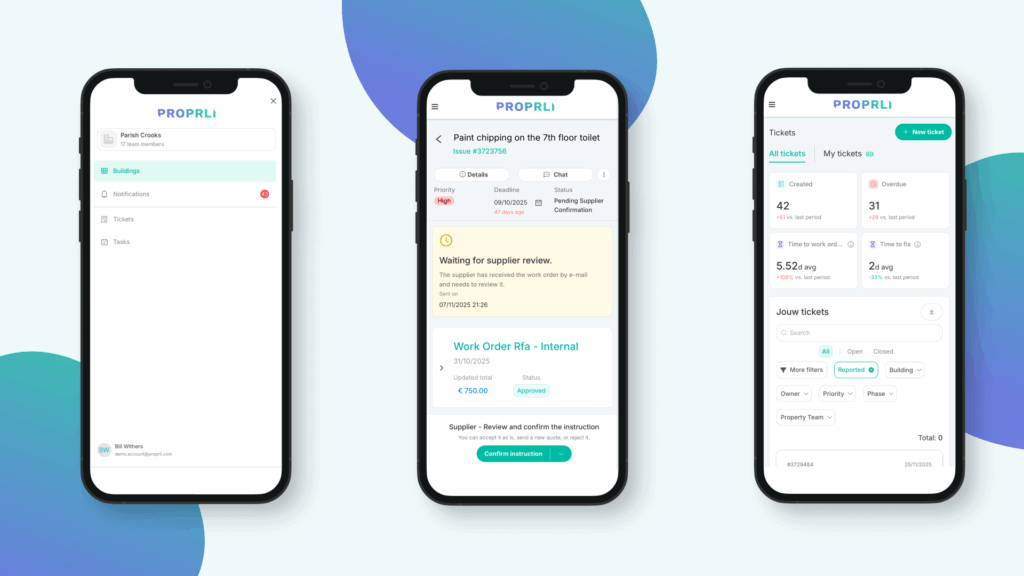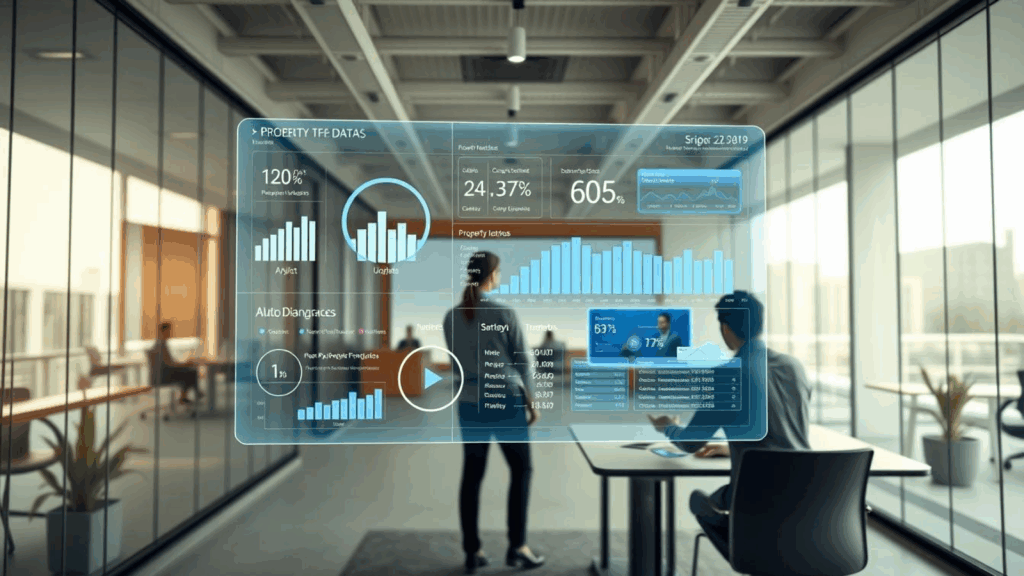PropTech solutions blend property and technology, sparking vast advancements in property management. This transformation has established a potent force, marking the dawn of technologically enhanced operations. They simplify complex procedures, amplify profitability, and improve tenant relationships. This change has redefined traditional property management, empowering managers and stakeholders to tackle industry shifts with confidence.
Key Takeaways
- PropTech solutions intersect technology and real estate management.
- Innovative real estate solutions streamline complex processes.
- Enhanced tenant relations and profitability are major benefits.
- Transitioned property management from traditional to tech-enhanced methods.
- Empowered managers and stakeholders to adapt confidently to industry changes.
The Evolution of Property Management Through PropTech
The landscape of property management has seen a dramatic shift with the rise of property technology. This change has moved operations from manual and laborious to efficient and data-informed. Now, property managers have access to real-time analytics and insights, thanks to these tech advancements.
Modern real estate technology has significantly propelled this evolution. Automation and AI now stand as pillars in this sector. They allow property managers to reduce manual work and prioritize strategic decisions. Consequently, these innovations lead to more efficient management and improved tenant relationships.
The Advent of Proptech and Historical Milestones
Tracing the journey of Proptech, we witness a shift from basic beginnings to advanced integrations. These changes radically alter the property management landscape. The rise of smart property management has revamped real estate operations. It brings both efficiency and superior decision-making.
The Early Days of Proptech
In its initiation, Proptech was pivotal with online listing platforms that changed property searches and transactions. These digital tools were the groundwork for future advancements. They simplified the complex tasks in property management. Making it more efficient and accessible.
Key Historical Milestones in Proptech
As Proptech developed, it hit several significant milestones. The adoption of CRM systems improved inventory management and operations. Augmented reality and 3D imaging introduced immersive virtual property tours. AI chatbots transformed customer service, enhancing interactions and offering prompt help. Each milestone highlighted proptech software’s profound influence on modern property management.
| Milestone | Description | Impact |
|---|---|---|
| Online Listing Platforms | Streamlined property searches and transactions | Increased accessibility and efficiency |
| CRM Systems | Improved inventory management and organization | Streamlined operations |
| Augmented Reality | Enabled virtual property tours | Enhanced tenant experiences |
| AI Chatbots | Revolutionized customer service | Improved tenant interactions |
Key Proptech Innovations Transforming Property Management
PropTech innovations are changing how we manage properties, making everything more efficient. These advancements, like AI for predictive analytics, turn property management into a strategic, insightful activity. They enable managers to predict market trends and understand what tenants need.
Digital tools are also introducing smart solutions to buildings, boosting their energy efficiency. This not only cuts down on costs but also supports sustainability goals. For instance, smart thermostats and lighting systems optimize how we use resources.
Another key piece in this evolution is comprehensive property management software. It combines tenant management, maintenance planning, and financial tasks in one place. With these sophisticated tools, managers can oversee operations more accurately and reduce the need for manual work.
| Key Innovative Technologies | Benefits | Examples |
|---|---|---|
| AI for Predictive Analytics | Anticipates market trends, tenant needs | Market analysis tools, tenant demand forecasting |
| Smart Building Solutions | Enhances energy efficiency, reduces costs | Smart thermostats, automated lighting systems |
| Comprehensive Management Software | Integrates tenant management, financials | Property management platforms |
The table above sheds light on pivotal technologies reshaping property management. By embracing these digital tools, managers can navigate real estate’s complexities more effectively. This ensures top-notch service and boosts property values.
Automation and AI in Property Management
Automation has revolutionized how property managers handle their workload. It eliminates the need for manual processing of mundane tasks. This shift paves the way for a focus on growth and effective management strategies.
The Rise of Automation
At the heart of proptech, automation streamlines critical operations like collecting rent and managing maintenance requests. This efficiency leads to fewer errors and saves valuable time. The evolving nature of this technology continually meets the complex demands of managing properties today.
Artificial Intelligence: The Game Changer
AI has transformed real estate management by offering deep analytical insights. It predicts maintenance needs, gauges tenant happiness, and supports financial planning. AI’s role extends beyond simple task automation.
It sits at the forefront of proptech, enhancing data analysis for smarter decision-making. This technology improves how managers interact with tenants, leading to better experiences overall.
Integrated Platforms for Real Estate Operations
Today’s real estate market moves quickly, making integrated platforms crucial for property managers. These tools link financial, operational, and maintenance tasks together. This connectivity enhances efficiency across activities.
The Need for Integrated Solutions
The push for integration in real estate comes from the desire to streamline complicated tasks. Using these platforms, property managers effortlessly handle finances and real estate technology. Features like secure banking and automated transactions become simpler.
How Integrated Platforms Work
These systems unify various functionalities within an easy-to-use interface. By combining finance and real estate tech, they allow managers to oversee different property management aspects from one place. This not only improves efficiency but also guarantees data accuracy, meeting the expectations of modern renters.
For property managers aiming to improve their operations while focusing on financial precision, adopting these platforms is essential. They provide a strategic advantage in managing real estate effectively.
Smart Building Technologies: The Backbone of Modern Property Management
Smart building technologies are reshaping property management through IoT. They make managing properties more efficient and effective in the digital era. These systems offer real-time oversight of various building functions, improving the management quality of smart properties.
IoT allows building systems to exchange data, giving managers deep insights into energy use and system health. This information enables quick maintenance responses and supports energy-saving efforts. It also lets managers foresee and solve issues before they escalate, reducing operational hitches and prolonging system lifespans.
Below, we compare traditional and smart property management:
| Aspect | Traditional Property Management | Smart Property Management |
|---|---|---|
| Monitoring | Manual inspections | Real-time IoT data |
| Energy Efficiency | Reactive energy management | Proactive, AI-driven energy conservation |
| Maintenance | Scheduled or upon complaint | Predictive and preventive |
| Control | Localized | Centralized, remote access |
Smart building technologies showcase IoT’s immense potential in property management. They elevate control, cut operational costs, and improve tenant experiences. Adopting these technologies is a strategic step towards sustainable, intelligent property management.
The Potential of IoT and Smart Buildings
Combining IoT with real estate has opened new avenues in smart building tech. It enriches efficiency and tenant happiness. These technologies promote green practices and economy in management, essential for today’s property and asset managers.
Understanding IoT in Real Estate
IoT in real estate links multiple devices and systems inside a building. This network allows for real-time data gathering and processing. Consequently, property management becomes more insightful, significantly boosting operational effectiveness and tenant satisfaction. When smart home systems are applied, buildings evolve into forward-thinking, adaptive environments.
Benefits of Smart Building Tech
Smart building tech brings numerous advantages, positively affecting property functionality and occupant contentment. They aim to heighten energy efficiency, simplify maintenance routines, and elevate user experience. Properties under IoT smart home systems reach optimal functionality. They use resources wisely while ensuring premier living conditions.
To grasp the effect of smart building technologies on property management, consider this analysis:
| Benefit | Traditional Buildings | Smart Buildings |
|---|---|---|
| Energy Efficiency | Manual control | Automated, optimized usage |
| Maintenance | Reactive, after issues arise | Proactive, preventive maintenance |
| Usability | Conventional fixtures | IoT smart home systems |
| Tenant Satisfaction | Standard amenities | Enhanced with real-time adjustments |
Embracing IoT and smart building tech marks a pivotal shift for property managers towards superior operational efficiency and tenant happiness. These advanced systems pave the way for sustainable, highly functional, and sought-after living spaces.
Challenges and Opportunities in Implementing PropTech Solutions
PropTech solutions in property management offer unique challenges and opportunities. Understanding these aspects is crucial for leveraging tech-driven property management to its fullest. Navigating through them determines success in the modern real estate market.
Common Challenges
One major hurdle in adopting proptech is the significant initial investment required. This not only covers the technology’s cost but also its integration into current systems. Additionally, there’s a need for extensive staff training to ensure the tools are used effectively. Another critical issue is ensuring data security, as reliance on digital systems increases.
Opportunities for Growth
Despite these challenges, the opportunities proptech presents are vast. Adopting cutting-edge technologies allows for sustainable practices in property management. Moreover, these innovations streamline operations by automating tasks and offering real-time data for improved decision-making. Ultimately, embracing proptech grants a long-term competitive edge, establishing property managers as industry pioneers.
FAQ
What is PropTech and how does it apply to real estate technology?
PropTech, short for property technology, harnesses advanced tech like automation, AI, and integrated platforms. It aims to enhance and streamline property management. Innovations include smart buildings, digital real estate tools, and robust proptech software. These innovations upgrade traditional property management techniques.
How has PropTech evolved over the years?
PropTech’s journey began with simple online listings. It has expanded to include big data, cloud computing, and AI. Milestones feature CRM systems for keeping track of inventory, augmented reality for virtual tours, and AI chatbots. These tools have significantly changed how properties are managed and sold.
What are some key innovations in PropTech that are transforming property management?
Significant advancements encompass AI for predictive insights and smart technologies for energy efficiency. Integrated PropTech platforms now bring together financial, operational, and maintenance aspects. These innovations shift property management towards a strategic, data-informed process.
How does automation benefit property management?
Automation lessens mundane tasks, shifting focus to strategic decisions. It boosts operational efficiency and precision, impacting everything from finances to maintenance. Thus, productivity in property management sees substantial improvement.
In what ways is AI considered a game-changer for property management?
AI revolutionizes property management by analyzing data for real-time operational and tenant insights. It’s pivotal for maintenance forecasting, energy optimization, and improving tenant experiences. Indeed, AI’s role in PropTech solutions is indispensable.
Why are integrated platforms important for real estate operations?
Integrated platforms merge various property management areas into one system. They encompass financial dealings, daily operations, and upkeep management. This integration boosts efficiency, minimizes mistakes, and aids in superior decision-making.
How do smart building technologies contribute to property management?
Smart building technologies utilize IoT and data analytics for operational, energy, and maintenance insights. They offer enhanced control over systems, leading to savings and increased tenant satisfaction. Thus, they are vital in contemporary property management strategies.
What is the potential of IoT in real estate?
IoT unifies building systems into a single network, optimizing tasks like energy use and upkeep. Benefits include effective resource use, lowered costs, and enhanced tenant experiences through better building functionality.
What challenges might property managers face when implementing PropTech solutions?
Implementing PropTech comes with hurdles such as initial high costs, training needs for new tech, and securing data. However, navigating these challenges opens doors to efficient, sustainable operations. This gives property managers a lasting advantage in their field.






